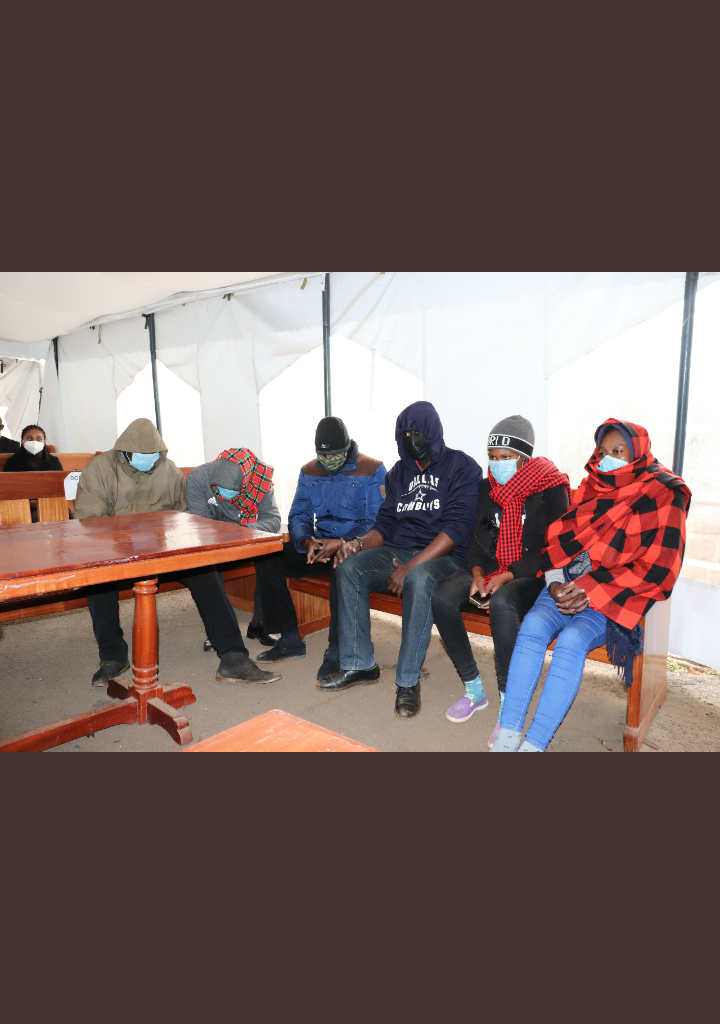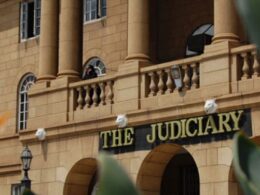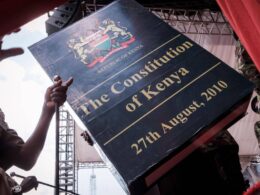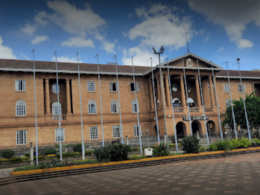By Susan Kendi
The six police officers linked to the death of Benson Njiru Ndwiga and Emmanuel Mutura Ndwiga will remain in custody at the Capitol Hill police station for 14 days after court denied them bail.
“The state through the DPP has demonstrated compelling reasons for the Court to deny the respondents bond or bail. Bond and bail is denied for 14 days pending investigations,” said Magistrate Daniel Ndugi.
The police officers: Benson Mbuthia, Consolota Kariuki, Nicholas Cheruiyot, Martin Wanyama, Lilian Cherono and James Mwanikiwere arrested on Monday evening and arraigned at Milimani Law Courts on Tuesday, August 17, 2021. They will be presented in Court on August 31 for plea taking.
The prosecution led by Ms. Jacinta Nyamosi made the application for remand of the police officers to, “give the investigators time to carry out the investigations without any interference either with the witnesses or the evidence.”
Holding brief for Lawyer Abu Iman, the President of the Law Society of Kenya Nelson Havi appeared on behalf of the family of Benson and Emmanuel.
“It should be noted that the motor vehicle where Benson and Emmanuel are alleged to have jumped out off was torched in circumstances that may lend credence to the suspicion of destruction of evidence,” said Nelson Havi.
The order to arrest and present the officers in Court was issued by the Director of Public Prosecutions, Noordin Haji, on Monday, August 16, 2021 when he gave directives to the Inspector-General of Police (IG), Hillary Mutyambai to take action.
In a statement, DPP Haji said that the arrest would “avoid any interference with evidence and or intimidation of witnesses” with the unconcluded investigations by the Independent Policing Oversight Authority (IPOA).
The communication was made following the preliminary investigation into the deaths of Benson Njiru Ndwiga and Emmanuel Mutura Ndwiga, who died at the hands of the police.
“The fact that the deaths ostensibly occurred while the deceased were in the custody of police officers calls for a full and fair investigations to establish the circumstances which led to the deaths. We are reliably informed that Independent Policing and Oversight Authority (IPOA) is currently finalizing their investigations in the matter,” he added.
The order was released hours after the IG Mutyambai announced during #engagetheIG that the officers involved in the two brothers’ death had been suspended to make room for investigations.
The Independent Policing Oversight Authority (IPOA) also issued a statement on the inquiry highlighting that the findings will be forwarded to the Director of Public Prosecutions. IPOA proposed three courses of action, one being that the officers be discharged of their duties.
“…As it stands now, the six officers face a capital offence – murder. This recommendation is not likely to take a different direction,” IPOA said.
The other two recommendations are that the police officers surrender their firearms and avail themselves alongside their commanders.
The power of social media played a role with the hashtag #JusticeForKianjokomaBrothers trending in Kenya both on Twitter and Facebook for more than a week. Kenyans, human rights organisations, coalitions, and some politicians took to the platforms to condemn the killings and call for accountability, compelling the institutions to act and expedite the inquiry.
Article 25 of the constitution of Kenya provides for the rights and fundamental freedoms that are not limited, and they include freedom from torture and cruel, inhuman, or degrading treatment or punishment, freedom from slavery or servitude, the right to a fair trial, the right to an order of habeas corpus. Further, Article 26 (3) on the right to life provides that no person shall be deprived of life intentionally, except to the extent authorised by the constitution or other written law.
This has also been spelled out in various international conventions and treaties that Kenya is a signatory. For example, article 2 of the Convention against Torture and Other Cruel, Inhuman or Degrading Treatment or Punishment.
According to media reports, the two brothers were arrested on Sunday, August 1, 2021, by police officers attached to Manyatta Police Station, for defying the 10 pm to 4 am curfew in the Kianjokoma shopping center. Following their arrest, the next day, the family searched several police stations in Embu; however, their efforts were in vain.
On August 3, the family filed a missing person’s report at Manyatta Police Station after being referred back by Runyejes police station. They were notified that Benson and Emmanuel jumped from a moving police car and died on the same day. They found the bodies at Embu Level 5 Hospital morgue.
Days later, a witness disclosed the events that lead two the death of the two, refuting the claims that they jumped off the police vehicle. The witness revealed that one of the younger brothers, Emmanuel, was the first to be arrested, and the police had hit him on the head and he was lying unconscious and his brother came to his rescue and one of the officers also hit him he fell on the ground. They were then ushered in the front seat of the police land cruiser. When those arrested arrived at the Manyatta station, they were asked to alight; however, the two brothers did not.
Benson and Emmanuel Ndwiga were laid to rest on Friday, August 13, 2021, in the same grave.
ICJ Kenya strongly condemns the senseless killings and other forms of police brutality and reminds the police that they must protect the citizens. As members of the Police Reforms Working Group (PRWG), we will keep our eyes glued to the matter and ensure justice is served. May Benson Njiru Ndwiga and Emmanuel Mutura Ndwiga rest in peace.












